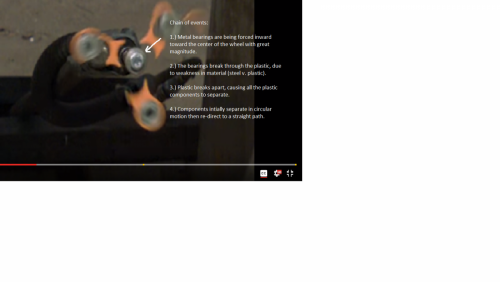-
Posts
641 -
Joined
-
Last visited
Content Type
Profiles
Forums
Events
Everything posted by Elite Engineer
-
warning..this post is going to have some serious ignorance attached to it so I get that the chronology is vacuum tubes > transistors > IC's.... I remember seeing an illustration of a vacuum tube. It had a battery/ power supply connected to the VT. The VT conducted electricity and then sent signals throughout the computer. Why even have the power source (wall outlet basically) connected to the VT, and just hook up the power source up to the computer directly, with little logic gates to get it work send 1's and 0's? ~ee
-
It's great that modern medicine can reduce HIV viral load to undetectable levels. However, I'm pretty opposed to their campaign of "U=U means you can't transmit the virus to your partner (...or partners *mind slowly begins to implode*)". This to me is the last thing you should be "OKing" with someone who is still HIV POSITIVE. IAPAC revealed a study that within 48 hours of not taking anti-viral medication, viral load rises to detectable levels. Whose to say that SOME people won't forget to take their medication for a duration of time. Why do you think we have MERSA AND VRE? Make sure you take your birth control EVERYDAY. Meanwhile thousands of babies are born because,"oops..forgot to take my birth control". I'm sorry, but they're treating the stigma, not the disease. You give these people their anti-viral's and say, "still, NO SEX". your thoughts?
-
are minerals generally inert? also light weight?
-
What are they made of? The one's you used in high school or college chem class. Are they made of a specific inert material? Cause if you do home chemistry experiments..you have to be careful of what you use: Wood table top: Cautious of hydrocarbons, heat from exothermic reactions/ burning, acid stains Glass table: Cautious of breaking glass, spilling hydrofluoric acid on glass, leaving stains from reagents Cement floor (in basement): not entirely practical. Lab bench top: Prevents against all these...what is it made of?
-
Wow, this was really detailed, very nice! However, the article doesn't mention anything about an inward force acting on the binding materials to cause it to warp and then separate. I don't believe the "inward force" mechanism explains why the spinner suddenly breaks apart. I say this after watching a slow-mo video of a fidget spinner breaking apart on a rotor at 30,000+ rpm' (screen shot provided below). In the screen shot of the video, you see that the spinner ruptures at the center, but also at the bearing housing, where the bearing are forced out of their plastic casing. I would think the center bearing would break apart because that's where most of the inward force in directed. But perhaps not based on material being steel. My one theory, however, is that the 3 bearings in the plastic arms are being forced inwardly, with such high magnitude that they break/crack the plastic arms, causing the entire apparatus to separate at the weakest points. As the spinner separates, the pieces do not fly out in a straight direction, because the arms are still initially spinning once breaking apart, and then eventually fly off in a straight direction. Here's the screen shots with explanations
-
(AHH the dreaded fidget spinner!) So in the video, a guy is rotating a fidget spinner held in a vice grip, with an air compressor. The spinner spins so fast that it eventually explodes/ tears apart. My questions is, what is the most probable mechanism to cause it to explode? Fidget spinners are mostly metal with a plastic casing holding the ball bearings in place. I have 2 thoughts on the cause of the explosion. Either the plastic over-heated and just split apart, or it was stressed from expansion of the spinner rotating too fast. Your thoughts? Pic of fidget spinner Video
-

Learning skills outside of college to advance career
Elite Engineer replied to Elite Engineer's topic in The Lounge
Thank you, this has helped me very much! I believe I was jumping the gun or getting over-worried! -

Learning skills outside of college to advance career
Elite Engineer replied to Elite Engineer's topic in The Lounge
Well, I'm afraid that the skills I'm honing right now are not the career I want to be in. I'm in a position with a low amount of research, with an objective of tweaking a 20 yr old product to pass FDA regulations, and keep our customers interested. I don't want to make slightly more efficient steam engine, I want to make a diesel engine. My appeal to learning intermediate programming and statistical software like R is based on job security and interest in new fields. Careers like mine dealing mostly with fundamental protein chemistry will be less and less in time. From what research and people have told me, it's best to supplement industry knowledge (2-5 years) with comp sci and programming..as that's where the jobs will be in the near future. If you have 7 years of exp. in protein chemistry..sure you know the general research process, and manufacturing understanding,.but that's not much on an edge with an increasing computational workforce. However you take that 7 years of industry and supplement an understanding of statistics and intermediate programming, you'll be a far better asset. -

Learning skills outside of college to advance career
Elite Engineer replied to Elite Engineer's topic in The Lounge
Ya I thought about this. I was hoping to get enough self taught knowledge (over 1-2 years) to get a good handle that was similar to uni courses. My university offers a bioinformatics degree. Such subjects in the major are: data structures, discrete structures, numerical analysis, linear algebra, calc III and probability. I have have friends that can program, that never went to school for it. I figured, I could teach myself, as i already know the rigorous biotech side...knowing programming and comp sci would give me an edge. -
I majored in biotech and do research on diagnostic kits for infectious diseases. Say I "teach" myself programming and even become certified in R or some kind of programming language involved in data science/ bioinformatics. Would industry knowledge (working in biotech 1-5 years) plus moderate knowledge of programming allow someone like myself to move into bioinformatics and/or genetics? Just trying to build up my assets without going back to school and majoring in another program. Thoughts appreciated. ~EE
-
Why JUST water...why not add a solute to the water to raise the boiling point?..a coolant. Salt, glycerol, etc. You're going to want to keep that water cold as long/ much as possible
-
It's a rather dumb question, but here it is: My thought of the major factor in efficiency between the two turbines is the amount of variation of temperature within the engine itself. *Does this hold true?* Here's my theory: The more consistent the temperature, the higher the efficiency. Gas turbine: Combustion of gases would have a slightly more temperature fluctuation due to occurrence of incomplete combustion of gases. Steam turbine: External source of heat constantly maintains gases' kinetic energy, keeping the heat consistent. Also water has a higher specific heat. Therefore, the steam turbine would theoretically be more efficient
-
Incase people are wondering why you add ACID to the WATER is because you want a heat sink when the acid is mixed with the water plus whatever else is in it.
-
So I'm working in research, designing diagnostic kits...private industry. The science involved is mostly protein chemistry..fairly basic biochemistry and bioseparation. My degree is in biotechnology, and I have a fairly good understanding of genetics. I'm interested in eventually getting into genetics...specifically gene therapy..but I'll do what I can get. Can any of you grey hairs give me some tips on this potential career transition? Would I be qualified for such a change? ~EE
-
gif of girl with amputated hands using bionic hand: https://gfycat.com/VacantRequiredAmethystinepython How does the bionic hand know/recognize nerve signals being sent to the area that would be her hand? Also, how is it calibrated that it provides the right amount of tension with the nerve signal? ~EE
-
Sucrose is a diasaccharide molecule, consisting of glucose and fructose. It's linked via a glycosidic bond.
-
Ya, you're right on the money with that. My co-workers all have different degrees: medicinal chemistry, biomedical sciences, biotechnology, biology, pharmacy, medical technology...etc. It really kinda bums me out that most life science studies (like the ones just listed), can pretty much do each other's jobs. I thought the "they'll replace you in a heart beat" talk was only in the minimum wage jobs..not professionally skilled job...Makes me feel like my knowledge is useless, and it sorta makes sense why the average ceiling pay for a life sciences career is around $55k. I see what you're saying about industry experience..it's pretty much my only edge to set me apart...that and networking. I guess I was hoping to get out of school and start making $60k right off the bat..like most engineers, early on..so i wouldn't have to be too "concerned" about finances. At the current rate, I'll probably hit $60k when I'm in my mid 40's. My friend in an engineer..same age, and schooling, and he's making $75k..with future wage raises looking very likely. How have any of you faired in life science careers? Resentful? Content? Overpaid? Underpaid?
-
I'm currently in a life sciences career. BS in Biotechnology, R&D, $38k /year). My boss tells me that life sciences isn't a good, long-term career. Don't expect to be making above $50k in your career, and to get out later on, or find a managerial position. Better career options would have been computer science or engineering. He's not being cold or rude...he's pragmatic and honest. My boss is a successful PhD, he knows life sciences well, he's trying to help me early on. Any suggestions on what to do with this info...any experience from your careers you can share? ~EE
-
I'm very shocked to hear this, but apparently overdose on benzodiazipenes alone is fairly uncommon. I always figured it would lead to severe CNS depression and the person would stop breathing. However, this only happens in conjunction with other drugs being taken at the same time..namely alcohol. My question is, by what mechanism can these drugs NOT kill you? I know that alcohol increases the binding affinity of benzodiazipenes to receptors, thereby enhancing their effect...but still I cant wrap my head around the fact that you can't overdose on 500 mg of benzo's. ~EE
-
Tedor, moving against the grain, and pushing your scientific career forward is the way of the scientist. Your passion for science should be a tank mowing down your obstacles. You must push yourself the achieve the career you want. This may mean you'll have to move away to college, , move away from your mother, accrue college debt, work lousy jobs while going to school. If your parents and teachers now won't support you, then you'll have to support yourself. What is you exact situation right now?..that is: grades, finances, classes, job(s), aspirations, colleges in mind, friends in science fields, science teachers you may know. Let us help you.







